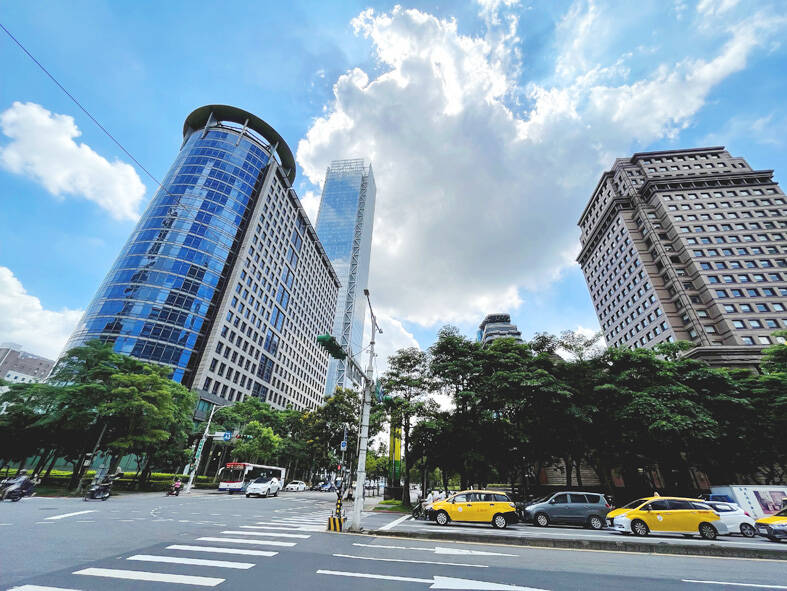Monthly retail rates for Taipei’s grade-A offices last year increased by 3.2 percent to NT$t2,975 per ping (3.3m2), driven by strong demand, but limited supply despite the lingering COVID-19 pandemic, real-estate agency Jones Lang LaSalle Taiwan Ltd (JLL Taiwan, 仲量聯行) said last week.
Monthly rent exceeded NT$4,000 per ping for most upscale offices in the city’s Xinyi District (信義) and could climb higher this year when new office spaces join the market, the company said.
The data showed that enterprises still have solid demand for high-quality office spaces, it said.

Photo: Hsu Yi-ping, Taipei Times
However, it remains to be seen if landlords would continue to have the upper hand, as interest rate hikes by domestic and foreign central banks slow economic growth and turn companies cautious on leasing decisions, JLL Taiwan said.
Office vacancy rates in Taipei averaged 2.6 percent last year, below 3 percent for four years in a row, the agency said, adding that the city’s figure compared with 7 percent in the Asia-Pacific region and 14 percent globally.
The local market showed the vacancy rate was more than 2 percent lower in Xinyi District — where potential tenants had difficulty finding office spaces due to a lack of supply — than other districts last year, JLL Taiwan said.
The Taipei market could see the entry of 45,000 ping of grade-A offices this year, mainly in Xinyi District, JLL Taiwan senior market director Brian Liu (劉建宇) told a news conference on Thursday last week.
The new office spaces would inject vitality into the market and ease the supply crunch, Liu said.
Second-tier areas such as Nangang District (南港) could become the next bright spot with 48,000 ping of new offices to become available over the next few years, due to the city government’s effort to build a new industrial cluster there, he said.
Environmentally-friendly and newly-built office spaces would gain popularity as companies assign increased importance to net zero carbon emissions, JLL Taiwan said.
Old office buildings could be forced out of the market unless they meet sustainability requirements through the urban renewal process, the company said.
On the other hand, inflation, monetary tightening and other economic headwinds would constrain leasing demand, it said.
The Financial Supervisory Commission last month raised the required minimum yield on property investments to 2.72 percent for life insurers, after the central bank adopted several interest rate hikes last year.
If interest rate hikes continue this year, the required minimum yield could exceed 3 percent by the end of this year, JLL Taiwan investment manager Sherry Wu (吳瑤華) said.
Investable properties would likely become scarce for life insurers and could affect the industry’s overall investment, she added.
The life insurance industry struggles to find investable property targets in Taipei and New Taipei City due to the relatively higher home prices in those areas, Wu said.
However, some commercial offices and leaseback factories in southern Hsinchu still support a yield of more than 3 percent, she added.

UNCERTAINTY: Innolux activated a stringent supply chain management mechanism, as it did during the COVID-19 pandemic, to ensure optimal inventory levels for customers Flat-panel display makers AUO Corp (友達) and Innolux Corp (群創) yesterday said that about 12 to 20 percent of their display business is at risk of potential US tariffs and that they would relocate production or shipment destinations to mitigate the levies’ effects. US tariffs would have a direct impact of US$200 million on AUO’s revenue, company chairman Paul Peng (彭雙浪) told reporters on the sidelines of the Touch Taiwan trade show in Taipei yesterday. That would make up about 12 percent of the company’s overall revenue. To cope with the tariff uncertainty, AUO plans to allocate its production to manufacturing facilities in

TAKING STOCK: A Taiwanese cookware firm in Vietnam urged customers to assess inventory or place orders early so shipments can reach the US while tariffs are paused Taiwanese businesses in Vietnam are exploring alternatives after the White House imposed a 46 percent import duty on Vietnamese goods, following US President Donald Trump’s announcement of “reciprocal” tariffs on the US’ trading partners. Lo Shih-liang (羅世良), chairman of Brico Industry Co (裕茂工業), a Taiwanese company that manufactures cast iron cookware and stove components in Vietnam, said that more than 40 percent of his business was tied to the US market, describing the constant US policy shifts as an emotional roller coaster. “I work during the day and stay up all night watching the news. I’ve been following US news until 3am

Taiwan will prioritize the development of silicon photonics by taking advantage of its strength in the semiconductor industry to build another shield to protect the local economy, National Development Council (NDC) Minister Paul Liu (劉鏡清) said yesterday. Speaking at a meeting of the legislature’s Economics Committee, Liu said Taiwan already has the artificial intelligence (AI) industry as a shield, after the semiconductor industry, to safeguard the country, and is looking at new unique fields to build more economic shields. While Taiwan will further strengthen its existing shields, over the longer term, the country is determined to focus on such potential segments as

COLLABORATION: Given Taiwan’s key position in global supply chains, the US firm is discussing strategies with local partners and clients to deal with global uncertainties Advanced Micro Devices Inc (AMD) yesterday said it is meeting with local ecosystem partners, including Taiwan Semiconductor Manufacturing Co (TSMC, 台積電), to discuss strategies, including long-term manufacturing, to navigate uncertainties such as US tariffs, as Taiwan occupies an important position in global supply chains. AMD chief executive officer Lisa Su (蘇姿丰) told reporters that Taiwan is an important part of the chip designer’s ecosystem and she is discussing with partners and customers in Taiwan to forge strong collaborations on different areas during this critical period. AMD has just become the first artificial-intelligence (AI) server chip customer of TSMC to utilize its advanced